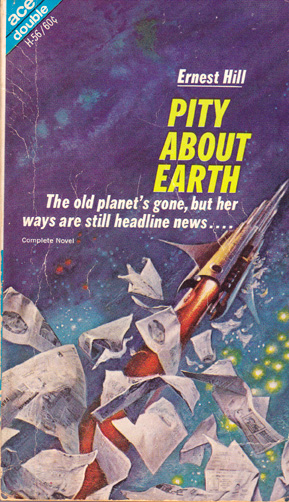Pity About Earth

Having finished my current backlog of new books and looking for a mindless diversion, I decided to give this story another chance. On the surface, it's about a newspaper advertising manager, Shale; his assistant, the alien Phrix from the planet Far-Groil; and Marylin, a human-ape hybrid. Set in the far future, long after Earth had been destroyed, Shale travels the galaxy looking for advertisers for the one major intergalactic newspaper, the Lemos Galactic Monitor. His adventures take him to the planet Asgard, home of the fabled, but never seen, Publisher, who sits atop the hierarchy and directs all.
Shale lives in a galaxy where the sole purpose of people is to consume. Newspapers print ads to drive people to buy advertisers products. If there is any news, it's written as a part of the ad. Shale maximizes his desires with no thought to other people. He is a cold-hearted, brutal, thoroughly self-centered hedonist who expects everyone else to be like him. Following the principle of "the survival of the fittest", he has climbed his way to near the top of the publishing world. He is rumored to have killed his mother when he was 14. Before meeting Marylin, he witnesses gruesome experiments done on caged humans in a laboratory engaged in the unfettered pursuit of science. Marylin, a human-ape hybrid produced by the lab, displays an empathy that Shale does not have. As the story progresses, Shale slowly begins to understand her point of view although he never abandons his ways. Phrix simply wants to be left alone to enjoy a contemplative life. He abhors violence and prefers to outwit his opponents. The common man, as epitomized by a police inspector, declaims:
What's good? Good's what sticks to rules and bad's what doesn't. I didn't make the rules, no more than you. ... People, thank Asgard, are conservative. They like things the way they've always known them. That's custom too and don't tell me what's custom isn't always right or I'll go straight back to Gromworld. I'm a policeman and I hope I know right from wrong.
When they reach Asgard, Shale and Marilyn find that there is no Publisher. Phrix, through circumstances not of his own making, finds himself in a position of power through control of the printing presses. He has an opportunity to remake the galaxy, but how should it be changed?
The story is a morality play. Shale represents uncontrolled selfishness. Marylin wants to live by love. Phrix is the mystic. The police officer represents the unreflective masses who think that what is customary is good. God does not exist. In the end, the author asks the question, "absent God, how should man live?" The book leaves that up to the reader.
"PIty About Earth" is a mostly unknown and forgotten book. The web has very little mention of it. One other review is here. I no longer think it's the worst story I've ever read. Perhaps Heinlein's "Beyond This Horizon" will take those honors. But maybe I need to read that book again, too.
blog comments powered by Disqus

